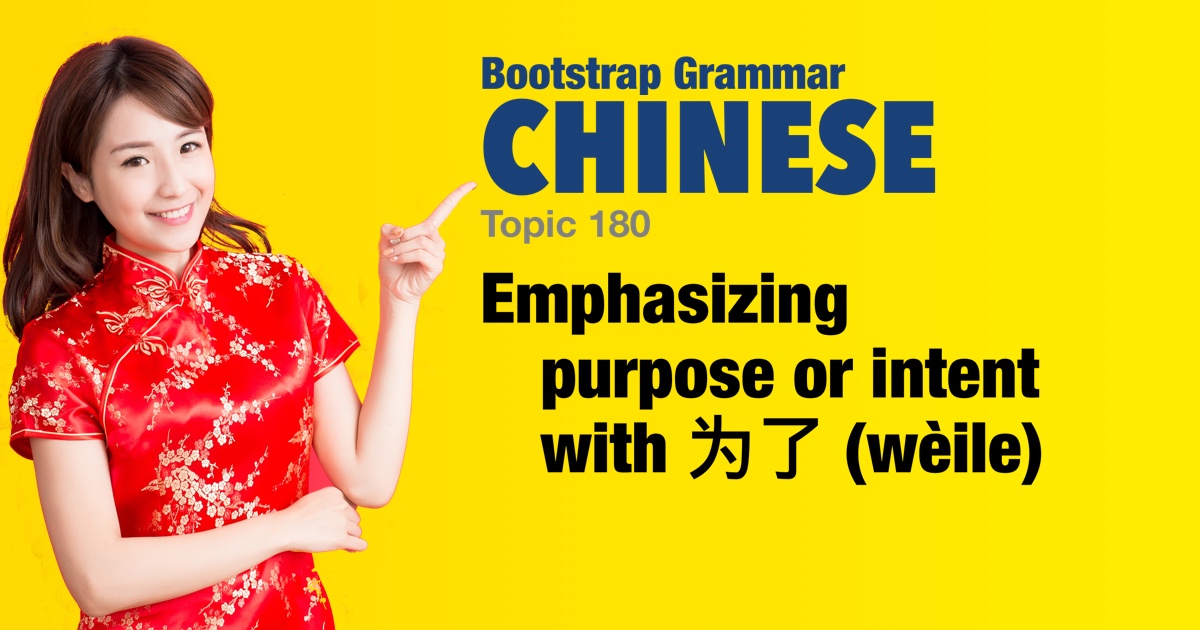Chinese grammar - Emphasizing purpose or intent with 为了 (wèile) |
|||
|
|||
The Chinese word 为了 (wèile) is used to clearly state the purpose or intent of an action. It can be used at the beginning of a sentence or before the verb phrase it modifies. — The equivalent in English might be 'so that', 'for the sake of', 'for the purpose of' or 'in order to'. Note that when 为了 is used adverbially rather than an introductory clause, it is typically preceded by 是 (shì). This puts more emphasis on the purpose or intent behind an action and is like adding 'the purpose being' in English. The pattern is then: [action] + 是为了 + [purpose/goal]. |
| Examples: | |
|
为了健康,我每天跑步。
wèile jiànkāng,#wǒ měitiān pǎobù. For the sake of health, I run every day. |
|
|
为了买新电脑,他努力工作。
wèile mǎi xīn diànnǎo,#tā nǔlì gōngzuò. In order to buy a new computer, he works hard. |
|
|
她学习汉语是为了将来去中国。
tā xuéxí Hànyǔ shì wèile jiānglái qù zhōngguó. She studies Chinese (the purpose being) to go to China in the future.
|
|
|
他工作很努力是为了养家糊口。
tā gōngzuò hěn nǔlì shì wèile yǎngjiā húkǒu. He works very hard (the purpose being) to support his family. |
|
|
为了提高中文水平,她每天学习两个小时。
wèile tígāo zhōngwén shuǐpíng,#tā měitiān xuéxí liǎng gè xiǎoshí. In order to improve her Chinese level, she studies for two hours every day. |
|
|
我存钱是为了买房子。
wǒ cúnqián shì wèile mǎi fángzi. I save money to buy a house.
|
|
|
她减肥是为了穿漂亮的衣服。
tā jiǎnféi shì wèile chuān piàoliang de yīfú. She loses weight to wear beautiful clothes.
|
|
|
他们努力工作是为了实现梦想。
tāmen nǔlì gōngzuò shì wèile shíxiàn mèngxiǎng. They work hard to achieve their dreams.
|
|
|
为了考试及格,我每天复习。
wèile kǎoshì jígé,#wǒ měitiān fùxí. In order to pass the exam, I review every day.
|
|
|
他参加培训班是为了提高技能。
tā cānjiā péixùnbān shì wèile tígāo jìnéng. He attends training courses to improve his skills.
|
|
|
为了看见明星,她早早到达机场。
wèile kànjiàn míngxīng,#tā zǎozǎo dàodá jīchǎng. To see the celebrity, she arrived at the airport early.
|
|
|
她学习钢琴是为了成为音乐家。
tā xuéxí gāngqín shì wèile chéngwéi yīnyuèjiā. She studies piano to become a musician.
|
|
|
为了保住工作,他每天加班。
wèile bǎozhù gōngzuò,#tā měitiān jiābān. In order to keep (his) job, he works overtime every day.
|
|
|
他去图书馆是为了借书。
tā qù túshūguǎn shì wèile jiè shū. He goes to the library to borrow books. |
|
|
为了环保,我们减少使用塑料袋。
wèile huánbǎo,#wǒmen jiánshǎo shǐyòng sùliàodài. For the sake of the environment, we reduce the use of plastic bags.
|
|
|
她报名参加比赛是为了挑战自己。
tā bàomíng cānjiā bǐsài shì wèile tiǎozhàn zìjǐ. She signed up for the competition to challenge herself.
|
|
|
为了减少开支,他们决定不出门吃饭。
wèile jiǎnshǎo kāizhī,#tāmen juédìng bù chūmén chīfàn. In order to cut expenses, they decided not to eat out.
|
|
|
他存钱是为了去旅行。
tā cúnqián shì wèile qù lǚxíng. He saves money in order to (be able to) travel. |
|
|
为了找到好工作,她继续深造。
wèile zhǎodào hǎo gōngzuò,#tā jìxù shēnzào. To find a good job, she continues her studies.
|
|
|
我们锻炼身体是为了保持健康。
wǒmen duànliàn shēntǐ shì wèile bǎochí jiànkāng. We exercise to maintain our health. |
|
 |
|


 Note the addition of
Note the addition of 
